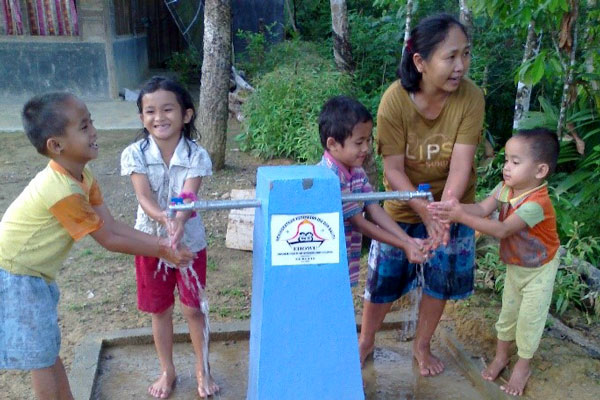While there have been global improvements in access to safe water in recent years, Indonesia still struggles. Of Indonesia's population of 260 million people, 33.4 million lack access to clean water and 99.7 million lack access to basic sanitation.
Remote island communities in Indonesia, where SurfAid works, are among the most affected by the absence of clean water and good sanitation. Heavily reliant on spring and rain water – exhaustible sources in the dry season – coastal communities are forced to use contaminated standing water and seawater. Salt water and bacteria, such as e-coli, cause extraordinarily high rates of preventable diarrhea, disease and death – especially among children under the age of five.
SurfAid's programs focus on clean water and sanitation as they are not only fundamental human rights; they are foundational building blocks necessary for improved health and economic development.
Following a "hand up, not hand out" philosophy, SurfAid's clean water facilities are constructed in collaboration with the communities. SurfAid staff provide the technical expertise and training, while the communities contribute their time and labour in construction, as well as local resources such as stone and sand. The facilities are owned and managed by community water committees, who are trained in operation and maintenance.
It is not enough just to have clean water. Complementary to building the water facilities, SurfAid focuses on education and behaviour change like handwashing and sanitation campaigns. Knowledge is power and this project has seen villages mobilise to improve their health by building latrines, thereby preventing waste water from contaminating drinking water, and increasing the number of Open Defecation Free (ODF) villages.
In Nias, SurfAid has partnered with communities to increase access to clean water and sanitation from 10% to 95%. Access to clean water, and good sanitation has significantly improved the health of the communities they partner with.
SurfAid's programs have demonstrated that community built, owned, and operated water and sanitation facilities underpin wider improvements in not only health, but social cohesion, education and poverty alleviation too.
SurfAid is supported by the Australian Government through the Australian NGO Cooperation Program.

